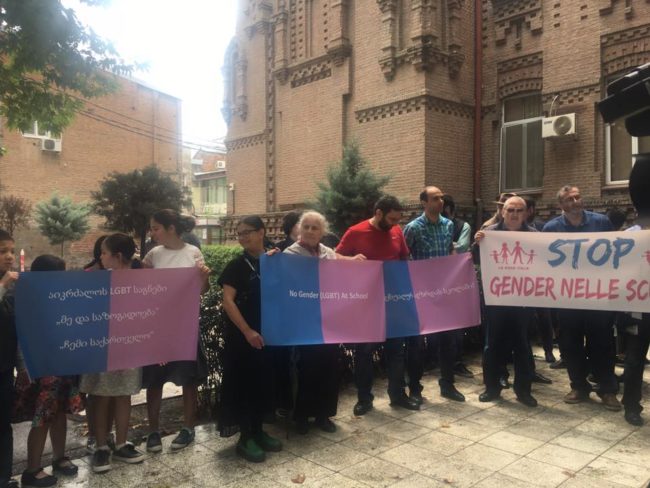
 After a small group of protesters marched in Tbilisi on 10 July against what they claim is ‘sex education’ in schools, Georgia’s Education Minister Aleksandre Jejelava said that the ministry would ensure ‘nothing unacceptable’ would be taught.
After a small group of protesters marched in Tbilisi on 10 July against what they claim is ‘sex education’ in schools, Georgia’s Education Minister Aleksandre Jejelava said that the ministry would ensure ‘nothing unacceptable’ would be taught.
The protests were sparked by a new citizenship class titled ‘Society and I’, which is due to be taught in schools starting in September. According to the official curricula, the class will discuss family, the school environment, friends, education, media and information, Georgia, and the state.
Jejelava said that the class will go ahead, but that they would ensure that ‘nothing unacceptable for students’ families will end up in the textbook’. The minister claimed that the content of the textbook for the class was consulted on with ‘all sides’, including clergy.
Protesters began demonstrating in front of Ministry of Education, later moving to Georgia’s parliament. They claimed that the new textbook would ‘corrupt children’.
‘They want to corrupt the upcoming generations, they want to discuss sex with them. [They will discuss] how a man should become a woman, how a woman should become a man. After they grow up, they can choose to be a man or a woman — that’s what they will teach kids’, one of the protesters told local news outlet Liberali.
Protesters said they would do everything to fight against the ‘genderisation of schools’.
Jejelava reaffirmed that the quotes cited by protesters were ‘from an unknown book, which is unacceptable’.
‘Society and I’ will be taught to third and fourth year students, while another subject — ‘Our Georgia’ — will be introduced for fifth and sixth year students.
Georgia, where the Orthodox Church is a hugely influential force, has tried to implement sex education in schools on a number of occasions, but has failed every time after widespread public backlash.




 12 July 2017
12 July 2017


